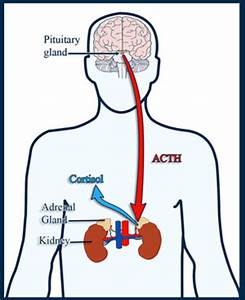
What Is Cushing’s Syndrome?
What Is Cushing’s Syndrome?
Cushing’s Syndrome happens when too much cortisol hormone is released into the body’s bloodstream.
Too much cortisol hormone released into the bloodstream can cause havoc on the body.
What Is Cortisol?
Cortisol is a stress hormone released by the adrenal glands.
The hormone cortisol is essential for your body’s fight or flight response.
When the cortisol hormone enters your body it;
- Helps your body respond to stress
- Reduces inflammation
- Increases how your body metabolisms glucose
- Helps in the regulation of your blood pressure
About Cushing’s Syndrome
Cushing’s Syndrome is also known as hypercortisolism.
The disease Cushing’s Syndrome occurs more frequently in women than in men.
Cushing’s Syndrome usually occurs in an age range of 25 to 40 years of age.
Cushing Syndrome Symptoms
The following are some Cushing Syndrome Symptoms
- Your stomach resembles a large beer belly
- You have red stretch marks on your stomach
- Your neck mirrors a buffalo hump
- Your face is puffy (often referred to as Cushing’s Syndrome moon face)
- You are exhausted, beyond tired
What Causes Cushing’s Syndrome?
- A tumor or tumors inside the body
- Consuming too much corticosteroid medications
Cushing’s Syndrome Diagnosis
Cushing’s Syndrome can be a difficult disease to diagnose.
There is no single definitive test that provides a Cushing’s Syndrome Diagnosis.
The diagnosis of Cushing’s Syndrome involves a thorough physical examination, a review of your medical history, symptoms and lab tests.
These laboratory tests may help provide a Cushing’s Syndrome diagnosis:
- 24-hour urinary (free cortisol test)
- Midnight cortisol plasma and late evening salivary cortisol measurements,
low-dose dexamethasone suppression test (LDDST) (blood test)
The National Institute Of Health (NIH) published that the PRKACA enzyme has been linked to a severe form of Cushing’s Syndrome.
The PRKACA enzyme code is regulated by the PRKAR1A gene.
The PRKAR1A gene has numerous functions in the metabolism of the cell.
The gene PRKAR1A gene has previously been found in a form of Cushing’s Syndrome.
The National Institutes of Health finds the PRKACA enzyme links its pathway in Cushing’s Syndrome.
You can read more about the National Institutes of Health (NIH) and their PRKACA enzyme finding at http://www.nih.gov/researchmatters/march2014/03102014cushing.htm
Cushing Syndrome Treatment
Cushing Syndrome treatment varies.
Your Cushing Syndrome treatment will depend on the cause of your hypercortisolism.
Depending on the cause of your Cushing’s Syndrome your doctor may prescribe medication.
Medication may help control your body’s cortisol production.
If your additional cortisol surge is caused by a tumor (tumors) then tumor (tumors) may be removed.
The disease Cushing’s Syndrome is the opposite of Adrenal Insufficiency.
What Is Adrenal Insufficiency?
Adrenal Insufficiency is an endocrine disorder.
This disorder occurs when the adrenal glands do not produce enough cortisol hormone.
You can click on this link to see a photo of the adrenal glands.
Adrenal Insufficiency may be primary or secondary.
Primary adrenal insufficiency is known as Addison’s disease.
In primary adrenal insufficiency, the adrenal glands are damaged and unable to produce enough cortisol for the body to run properly.
In addition to the cortisol hormone in primary adrenal insufficiency, the aldosterone hormone may also be lacking or may show low aldosterone hormone level.
Secondary Adrenal Insufficiency
Secondary adrenal insufficiency occurs when the pituitary gland is not able to produce enough adrenocorticotropin (ACTH) hormone.
Adrenocorticotropin is a hormone that stimulates the adrenal gland to produce the hormone cortisol.
If adrenocorticotropin is too low then cortisol hormone levels drop.
A decrease in adrenocorticotropin hormone over a period of time can cause the adrenal glands to shrink in size.
Low Aldosterone Symptoms?
- Salt cravings
- Lightheadedness or dizziness on standing
- Cognitive delay, confusion
- Fatigue
Extreme low aldosterone symptoms may show lab results of high potassium levels and low sodium levels.
The aldosterone hormone and the cortisol hormone are two essential hormones that the body makes.
On a personal note, I have secondary adrenal insufficiency caused by Sheehan’s Syndrome.
You can read about my HypoGal journey in, My Story.
I hope this HypoGal webpage, What Is Cushing’s Syndrome? is insightful.
Resources:
http://www.healthline.com/health/cushing-syndrome#Causes3
http://www.nih.gov/researchmatters/march2014/03102014cushing.htm
https://www.healthdirect.gov.au/the-role-of-cortisol-in-the-body
You may also find the following health references helpful:
You can find additional health references and shortcuts to living with a chronic illness on the HypoGal Blog.
Please, Like, HypoGal on Facebook.
“Play It Forward So Others Do Not Have To Rewind.”

